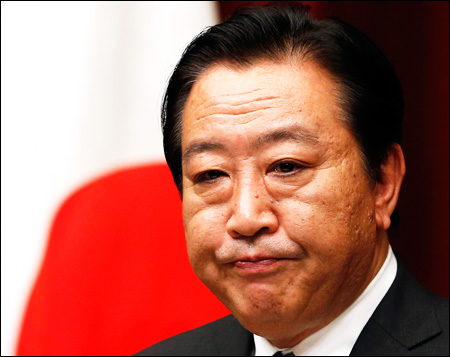Taking Japan back to past

Noda turns nationalistic on neighbors
Japanese Prime Minister Yoshihiko Noda is a determining factor in Japan’s confrontational stance in dealing with historical disputes with Korea, China and Russia. The history of Tokyo’s militarism and its devastating effects are on many people’s minds.
Experts say that Noda was conciliatory at least on the surface when he became prime minister last year but domestic political needs are forcing him to shift his stance. Some say that he is a “historical setback” to a political process to have Japan reflect its World War II and colonial misdeeds and reconcile with its neighbors.
Regarded as being far to the right in the ruling liberal Democratic Party of Japan, the 55-year-old Wasede University graduate violated diplomatic protocol by revealing the content of a letter of regret sent to President Lee Myung-bak even before the Korean President received it.
Now, Lee is expected to send a reply. Noda is planning to hold a Cabinet meeting to flesh out his plan to take the issue of Dokdo to the International Court of Justice (ICJ) alone, if Seoul continues its refusal to do so.
Noda, the son of a Japanese Defense Agency member, denies the rulings by Allied tribunals of some Japanese as Class-A war criminals. He also supports the practice of paying respect to those criminals enshrined in Yasukuni.
Concerns about his political tendency are being realized as Noda is hitting “nationalistic buttons” in his push for Japan’s territorial claims.
President Lee has revealed the frustration he felt last year when he met the Japanese leader during a summit.
Lee said he spoke for more than an hour to explain to him why Korea had no plan to accept Japan’s call to remove the statue of a girl in traditional costume, which was put up in front of the Japanese Embassy in Seoul to commemorate the 1,000th weekly protest against war-time sex slavery by the Japanese military during World War II.
But some analysts disagreed. Japan observers said Noda had several headaches in domestic politics, such as the recent consumption tax hike on which he staked his political career.
The Japanese prime minister wrote after attending President Lee’s inauguration speech in February 2008, that Lee was an example of the new type of leader that Asia needed.
Japan watcher Corey Wallace predicted in 2011 that Noda will take a constructive approach to Japanese-Korean-Chinese diplomacy if conditions allow.
Now, he has changed his stance. He is chafing China as well as Korea. David Kang, professor of international relations and business at the University of Southern California, said Japan is to blame for rising tensions.
“I would characterize Korea, China and even Russia’s moves over the disputes as reaction to Japanese moves,” he said.
“It’s surprising that Japan, with a weak economy, declining population and no real vision for the future, is now picking territorial disputes with every single one of its neighbors.”
Kang said, “What is often overlooked in the West is that the Japanese seem determined to make an issue of territorial or historical disputes.”
Another analyst pointed his finger at the power shift in East Asia ― the rise of China and the relatively wane of Japan ― as another factor facilitating territory disputes there.
Tokyo handles each territorial dispute differently.
On the Senkaku Islands controlled by Japan, it is taking a low-key position so as not to make the issue flare up. Last week Tokyo deported detained Chinese activists arrested for landing on the islands after just two days.
This is in stark contrast with how Japan has acted concerning Dokdo and Kuril Islands controlled by Korea and Russia, respectively. Tokyo, in a calculated move, tries to heighten tensions to extend its claims over the territories.
“Japan sticks to the position that it will resolve the territorial issue of the Kuril Islands bilaterally with Russia as Moscow is open to talks,” said Nam Sang-gu, a researcher at the state-run Northeast Asian History Foundation (NAFH). “However, it again takes a different stance on Dokdo as Seoul rejects any talks or the ICJ option.”
Nam said this has motivated Tokyo to come up with harsher, retaliatory measures against Seoul in the ongoing territorial row.
“The main opposition Liberal Democratic Party criticized the Noda administration for its alleged weak-knee diplomacy,” he said. “As elections near in Japan, Noda cannot but take a hard-line stance on the territorial issues, and Dokdo is the right target.” <The Korea Times/Kang Hyun-kyung, Chung Min-uck>




